Complete Guide . 2026 Edition
Complete step-by-step guide covering game design, math, RNG, tech stack, and realistic costs for both social casino and real-money gaming.
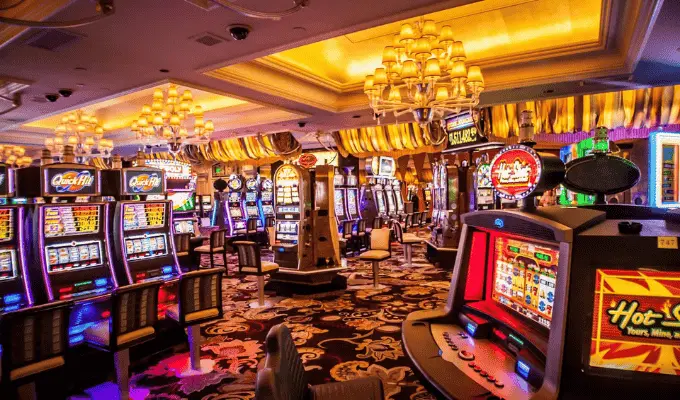
Slot games are still one of the highest-performing game formats across social casino and real-money gaming (RMG)—but building a modern slot in 2026 requires more than reels and symbols. You need solid game math, certified RNG, scalable backend, analytics-driven LiveOps, and a UI that converts.
Want a team to build it end-to-end? Explore our Slot Game Development service:
Slot Game Development Company
View Case Study
Choose The Slot Type
Before design or coding, decide your product category:
A) Social Casino Slot
Most common approach
- Uses virtual coins; monetizes via IAP, ads, subscriptions
- Faster approvals, broader reach
- Requires fraud controls, economy tuning, and LiveOps
B) Real-Money Slot (RMG)
Regulated environment
- Strong regulation requirements
- Needs RNG certification, jurisdiction rules, KYC/AML
- Includes operator/platform integration
Recommendation: Most teams start with Social Casino for fast market entry, then adapt to RMG with certification + compliance layers.
Building a Slot Game?
Get a production estimate + recommended tech stack (Unity / Web / Backend + analytics).
Core Parts of a Slot Machine Game
Every modern slot (social or real-money) includes:
Gameplay Components
Core Elements:
- Reels (3–6 reels, typically 5)
- Symbols (low/mid/high, wild, scatter)
- Paylines or ways-to-win
- Paytable (symbol values + bonus rules)
Special Features:
- Bonus features (free spins, multipliers)
- Win presentation (VFX/SFX)
- Big win moments
- Near-miss mechanics
Product Components
- Economy system (coins, sinks, bundles)
- LiveOps (events, quests, seasonal)
- Crash reporting + monitoring
- Analytics events + dashboards
- Fraud detection
- Admin panel for tuning
Slot Game Math (RTP, Volatility, Hit Rate)
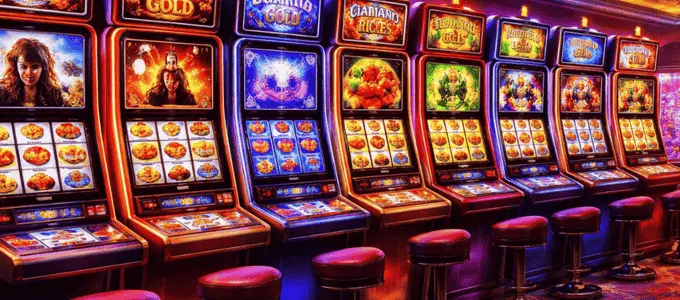
Slot “feel” is mostly math, not art.
RTP
Return to Player
Long term expected payout percentage. Example: 96% RTP returns ~96 coins per 100 wagered.
Volatility
Variance
Low: frequent small wins
High: fewer wins, bigger spikes
Hit Rate
Win Frequency
How often any win occurs. Typical range: 25–35%
Practical Approach (Simple Framework)
- Choose RTP target (e.g., 92–96 for social; RMG depends on jurisdiction)
- Decide volatility style (casual = lower, core casino = medium)
- Build symbol distribution + paytable + bonus probability
- Simulate millions+ spins and verify: actual RTP, hit frequency, bonus frequency, payout curve
Related Reading: Casino game architecture for math, storage, and payout verification
UI/UX Design That Feels Premium
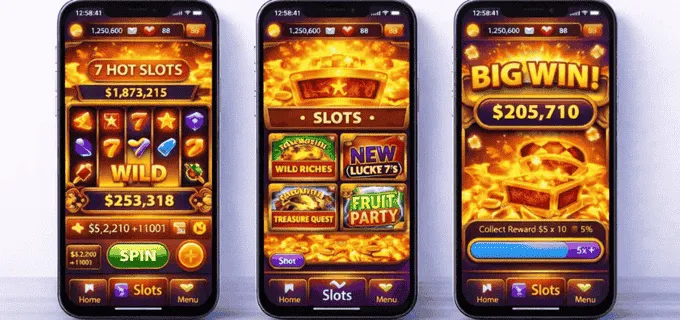
Your UI should do two things: feel premium, and support monetization without looking spammy.
Best-Practice UI Rules
- Keep the spin button dominant, thumb-friendly (mobile)
- Provide instant clarity: bet size, balance, win amount
- Use micro-animations (button press, reel start/stop)
- Present big moments well: big win, mega win, bonus entry
- Maintain readable contrast (dark backgrounds + bright UI accents)
UX Elements Players Expect in 2026
- Quick bet change + "hold to spin"
- Skip animations option
- Accessibility: color contrast
- Turbo / Auto spin (with safe limits)
- Clear bonus explanations
- Readable typography
Need Slot Game Math + UI/UX Done Right?
We design RTP/volatility models, bonus logic, and conversion-friendly UI with LiveOps readiness.
UI/UX Design That Feels Premium
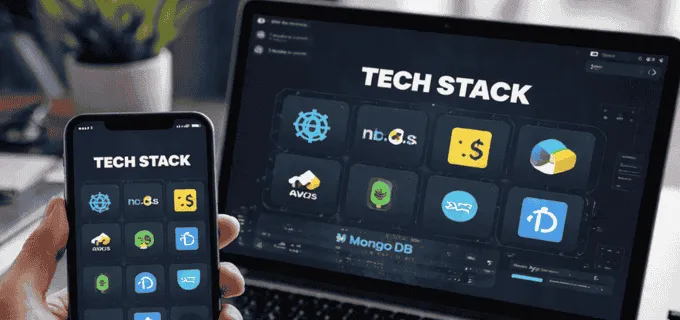
Option A: Unity
Best for: mobile first, rich animation, faster iteration
Option B: Web/HTML5
Best for: instant play, operator portals, cross platform browser deployment
(Still requires solid backend + anti fraud + caching)
Option C: Unreal
Best for: high-fidelity visuals / unique 3D casino experiences
(Rare for slots, but used for premium casino experiences)
Recommendation: Start with Unity for the client and build your backend to support multi platform.
Backend & LiveOps Architecture
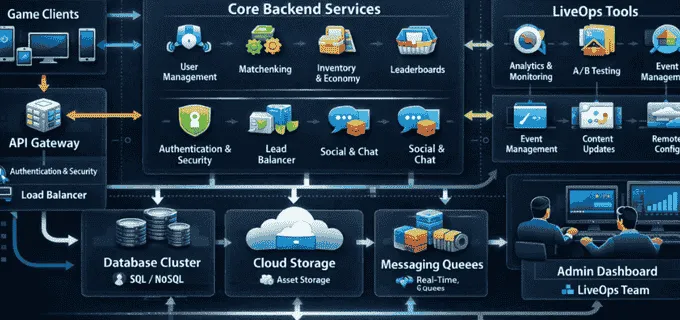
A slot game without LiveOps is a short-lived product. The backend should support:
Must-Have Backend Services
- Player profile + inventory
- Session validation, anti-tamper
- Offers/store
- A/B testing
- Wallet/balance (virtual or real)
- Config service (events, bonuses)
- Leaderboards
- Telemetry + analytics
LiveOps That Drives Revenue in 2026
- Daily missions / streaks
- Limited-time events (collect, spin goals)
- Seasonal passes (soft version works well for social casino)
- Offer personalization based on spend/behavior
RNG, Fairness & Certification
Social Casino
You still need fairness and consistency—especially to avoid:
- Exploit loops
- Economy imbalance
- Legal risk from "misleading odds"
Real-Money (RMG)
You’ll typically need:
- Certified RNG approach (depends on jurisdiction)
- Auditable logs
- Secure outcome generation
- Compliance-ready reporting
Important Principle: In regulated environments, you don’t “fake” outcomes. The math model and RNG logic must be verifiable and consistent.
Compliance + Platform Constraints
Slots can be sensitive for:
Must-Have Backend Services
- Jurisdiction rules (RMG)
- Store policies (Apple/Google)
- Ad network policies
- Age gating and disclosures
Even for Social Casino, You Should:
- Avoid misleading odds messaging
- Apply clear responsible gameplay UX
- Implement anti-fraud + anti-abuse
For end-to-end production work across game categories:
Game Development Company
QA Checklist
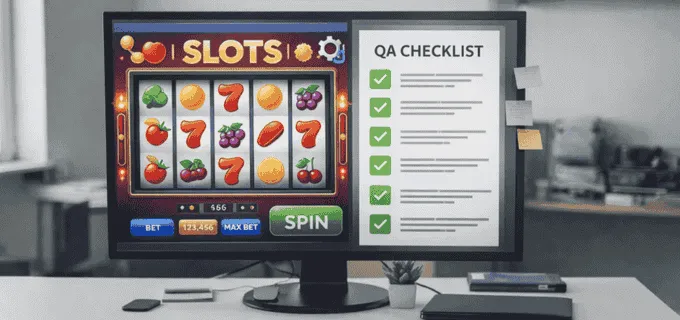
Slots break in unique ways—especially bonuses and edge cases.
- Reel stop logic never desyncs from outcome
- Paytable is correct for all symbols
- Bonus triggers match probability rules
- Multipliers stack correctly
- Auto-spin respects limits and interrupts correctly
- Economy: bet sizing + affordability checks
- Store offers deliver correctly (and restore purchases)
- Analytics events fire correctly (spin_start, spin_result, bonus_start, bonus_end, big_win, purchase)
- Performance: stable FPS, no memory spikes
- Anti-cheat: tamper detection, request signing
- Crash logs + monitoring enabled
Cost to Build a Slot Machine Game in 2026
Costs depend on: features, platform, art complexity, and backend scope.
| Slot Type | Scope | Cost Range |
|---|---|---|
| Basic Social Slot | 1 theme, simple bonus, minimal backend | $15k – $35k |
| Mid-Level Slot | Multiple features, economy, offers, analytics | $35k – $80k |
| Advanced Social Casino Slot | LiveOps, A/B testing, personalization | $80k – $150k+ |
| RMG Slot | Certification + compliance + operator integration | $120k – $300k+ |
Want an accurate cost? Share your scope and we’ll map a production plan.
Get a Real Quote (Not a Guess)
Share your platform (Social or RMG), reel format, bonus ideas, and target timeline—we’ll respond with a clear scope + budget range.
Timeline: How Long Does It Take?

A realistic timeline (for a quality build):
Week 1–2
Discovery, math plan, UX wireframes, tech plan
Week 3–6
Core gameplay + reels + base UI + payout logic
Week 7–10
Bonus features, economy, store, analytics
Week 11–12+
QA hardening, LiveOps hooks, optimization
RMG Additional Time
Add 4–10+ weeks for certification + compliance (depending on scope/jurisdiction)
Common Mistakes to Avoid
Starting with art before math
Weak win presentation
No LiveOps plan
No anti-fraud
No analytics event strategy
Conclusion
Creating a slot machine game in 2026 is a blend of math + design + engineering + LiveOps. If you get the fundamentals right (RTP/volatility, UI feel, scalable backend, analytics, and fair outcomes), you can build a product that performs long-term.
If you want a team that can take you from concept to launch, start here:
Ready to Build?
We’ll help you choose the right platform, math model, and LiveOps plan—and ship a slot game that performs.
FAQ's
How do I create a slot machine game from scratch?
To create a slot machine game from scratch, start by planning your game concept, choosing a platform (like Unity or HTML5), and designing reels, symbols, and bonus features. Then, program the core logic using a slot game programming language like C# or JavaScript, integrate audio/visuals, and test thoroughly.
What is the best platform to build a slot game?
Unity is widely considered the best platform to build a slot game in Unity, thanks to its flexibility, cross-platform support, and strong community. For browser games, HTML5 and JavaScript are great choices.
How much does slot machine game development cost?
The slot game development cost typically ranges from $10,000 to $50,000 or more, depending on the features, platform, visuals, and licensing requirements. Real-money apps may also require certification and legal fees.
Which programming language is used for slot games?
Common slot game programming languages include C# (used in Unity), JavaScript (for HTML5 games), and TypeScript or Lua depending on the engine. C# is ideal for cross-platform and mobile slot games.
Can I monetize a slot machine game without real money gambling?
Yes! You can use in-app purchases, rewarded ads, and freemium models to monetize your casino game app without offering real-money gambling. Many successful mobile slot games earn revenue through virtual currency systems.
Do I need a license to publish a slot machine app?
If your game involves real money betting or payouts, you need a gambling license from jurisdictions like Malta, UK, or Curacao. For social casino games, licensing may not be required, but you must still comply with app store and privacy policies.
How do I ensure fairness in my slot game?
To ensure fairness, implement a Random Number Generator (RNG) algorithm and get it certified by recognized labs such as iTech Labs or GLI. This is mandatory for real-money slot games and recommended even for free-play versions.
What features should I include to make my slot game engaging?
To keep users engaged, include features like free spins, multipliers, wilds, daily bonuses, and themed mini-games. A strong visual design, responsive UI, and immersive sound effects also improve user retention.



